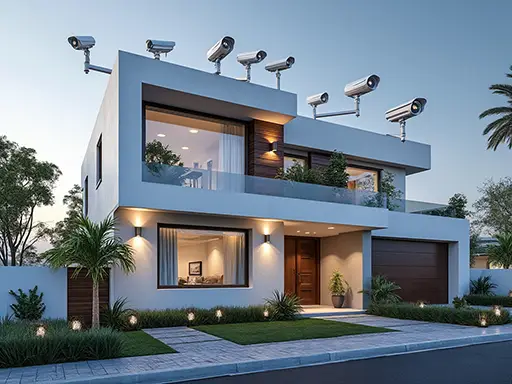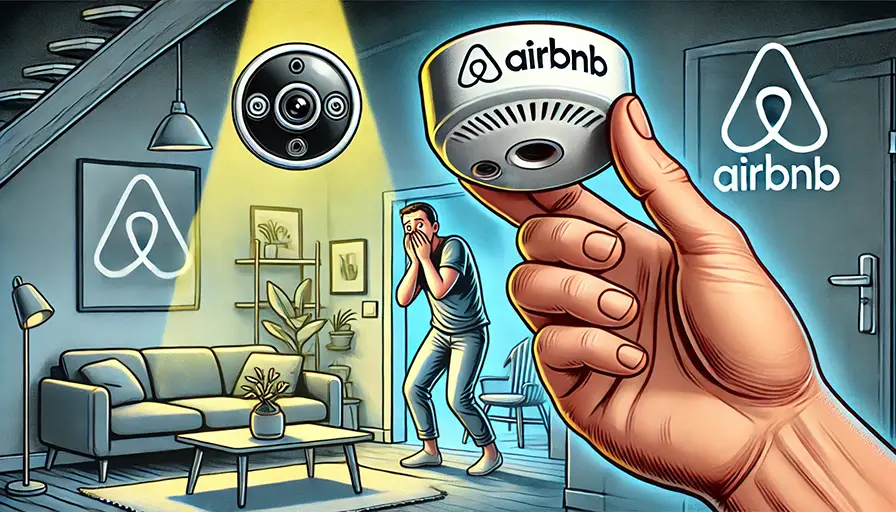A Call for Stronger Privacy Protections
- Discover how widespread hidden camera incidents are impacting Airbnb guests.
- Learn why proactive steps like using Incognito Browser can shield your online activities from prying eyes.
- Understand the urgent need for comprehensive privacy laws to hold companies accountable.

A Frightening Reality for Airbnb Guests
Imagine settling into your vacation rental only to discover you were being secretly recorded. This nightmare has become a chilling reality for numerous Airbnb guests, as revealed in an ongoing investigation that underscores the short-term rental giant’s failure to protect its users.
The most recent case involves a woman secretly captured undressing at a rental property, with her images later found on the computer of an alleged sexual predator.
Typical of such scenarios, Airbnb aims for swift and confidential settlements in hidden camera cases. However, this time, the situation unraveled differently.
During a court-ordered deposition early last year, an Airbnb representative unveiled the company’s staggering hidden camera issue, disclosing that it has generated tens of thousands of customer support tickets related to surveillance devices over the past decade.
Despite these unsettling revelations, Airbnb reportedly doesn’t inform law enforcement when complaints about hidden cameras arise—not even when children are involved.
Instead, they may notify hosts as part of internal inquiries, a move criticized by experts as potentially hindering criminal investigations. This approach suggests that Airbnb prioritizes its image over guest safety.
Experiences That Shatter Trust
Airbnb’s lackluster response has left many victims living under a shadow of fear, worried that their most private moments could become fodder for the internet.
Take the case of Chloe LeBrument, who found a hidden camera disguised as a charger during her stay at an Airbnb in London, Ontario. The unsettling discovery and subsequent legal battles highlight how prevalent—and damaging—these invasions of privacy have become.
Given these violations, it’s time for individuals to take control of their online privacy both inside and outside of rented spaces.
Utilizing secure tools like the Incognito Browser for private browsing can significantly enhance personal security.
When you open an incognito tab or window via Incognito Browser, your activities are less likely to be tracked or exploited—even more effectively than standard browser incognito modes.
The Wild West of Short-Term Rentals
Airbnb’s meteoric rise—from its inception in 2007 to becoming a publicly traded company valued higher than Hyatt and Marriott combined—hasn’t come without bumps.
Unlike traditional hotels, Airbnb doesn’t employ on-site staff or assume full legal responsibility for guest safety.
Instead, it distances itself from liability by asserting limited control over listed properties.
While hotels must adhere to strict regulations and can be held accountable for guest harm, Airbnb often escapes such scrutiny by leveraging legal shields like Section 230 of the Communications Decency Act.
This 1996 law protects tech platforms from being held responsible for user-generated content, but shouldn’t extend to issues where consumer safety and privacy are blatantly compromised.
Regulatory Inertia and the Need for Change
Brian Chesky’s pledge in 2019—that all Airbnb listings would be verified following a deadly Halloween party at an unregulated property—has yet to fully materialize. Recent disclosures indicate that only about 20% of listings have undergone verification.
Even more concerning is that the company’s identity checks fall short, failing to uncover severe criminal histories as evidenced by an incident involving a registered sex offender hosting through Airbnb in Australia.
For meaningful change, we need comprehensive privacy laws that hold companies accountable and fill gaps left by outdated regulations.
The American Privacy Rights Act is one potential solution aiming to grant people greater control over their data while imposing stricter requirements on companies handling sensitive information.
In the meantime, tools like the Incognito Browser can offer vital protection against digital spying and other forms of data exploitation.
By opting for incognito mode private browsing sessions, users can actively manage their digital footprint and safeguard their private moments from unwarranted intrusion.
The Lingering Trauma
Tragically, victims of hidden cameras face enduring psychological trauma. Whether it’s the anxiety over shared intimate moments resurfacing online or the stress from potential exposure of their children, the consequences are both profound and persistent.
Conversely, offenders often receive lenient sentences, as seen in numerous cases where perpetrators like “superhost” Peter Madden served minimal jail time despite grave transgressions.
This recurrent pattern emphasizes the system’s failure to deliver justice appropriately and protect future victims effectively.
Looking Forward
As more hidden camera scandals unfold within the short-term rental industry, it’s clear that individual vigilance coupled with legislative reform is essential.
The horrifying extent of privacy violations calls for travelers to adopt best practices in securing their online and offline activities.
Employing secure platforms like Incognito Browser can provide an additional layer of safety until more stringent privacy laws are enacted.
Ultimately, achieving a balanced digital future requires coordinated efforts encompassing consumer awareness, robust legal frameworks, and technological advancements tailored to safeguard our personal lives against intrusions.



